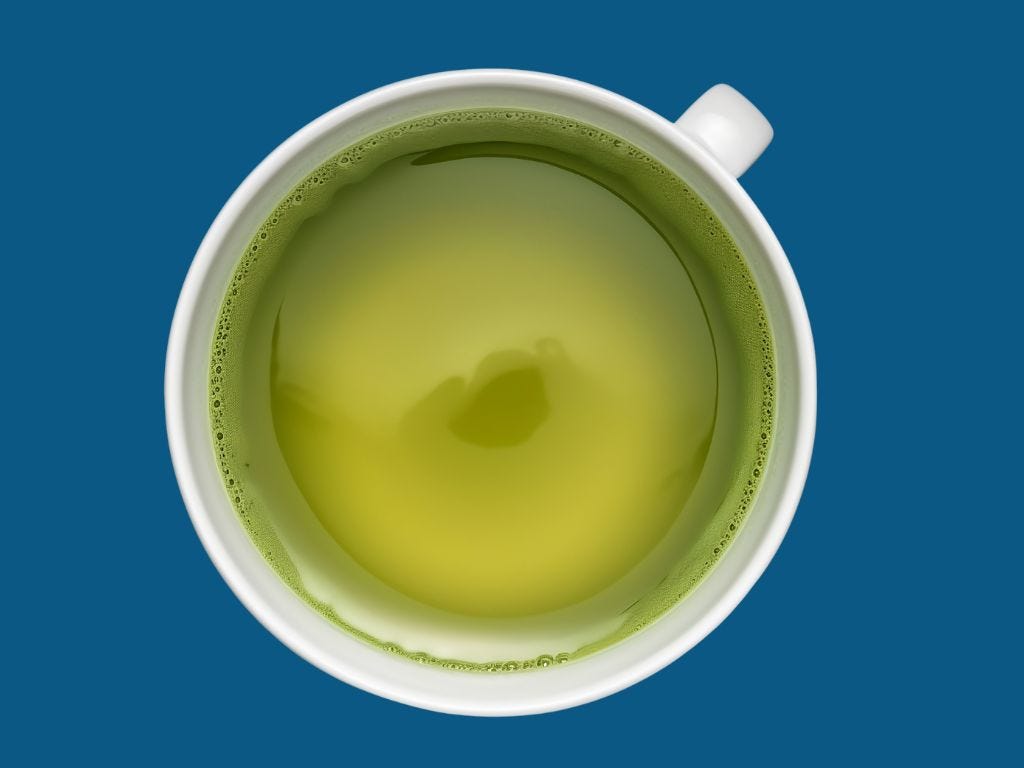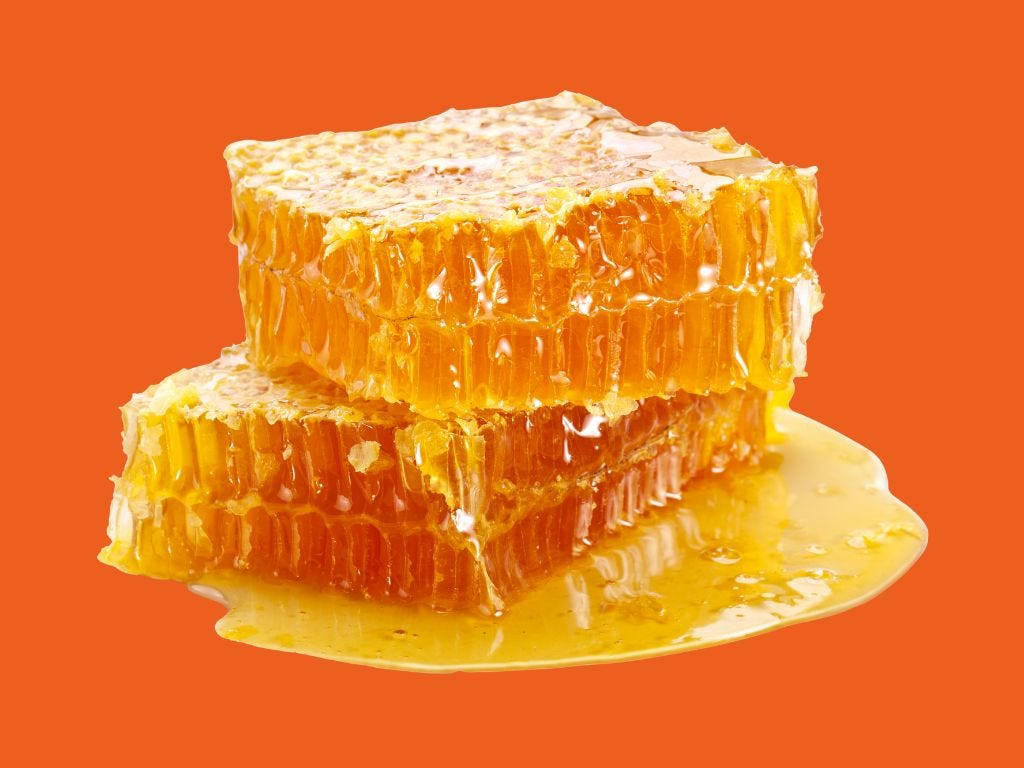What to eat when you’ve got the flu 🧠
5 everyday foods to help you bounce back
As much as I love autumn, it also means flu season has well and truly begun.
(It certainly got me, I’m wrapped up in blankets as I write this, sipping green tea.)
As the weather gets colder, we spend more time indoors and in close contact with each other - huddled onto buses, trains, and tubes - perfect conditions for flu viruses to spread.
Cold, dry air also helps the virus survive longer, and our immune defences can dip slightly in the darker months with less daylight and vitamin D.
I thought you might like to know what to eat to help guard against catching a bug, or help you recover quicker when you do.
I’ve opened this post up for everyone - feel free to share it with anyone who’s currently curled up with a box of tissues this week.
To start, very few whole foods have strong, consistent evidence when it comes to colds and flu.
Most research looks at supplements, extracts, or specific probiotic strains - and while there are still some foods with early, interesting evidence worth knowing about, it’s just not as solid as it’s often made out to be.
So with that in mind, here’s what to eat that may help you bounce back, or simply make being under the weather a bit easier.
Green tea
I’ve got a big pot of green tea beside me as I write - it’s one of the foods that might just help you recover faster. Or at the very least, it’s soothing for sore throats and comforting too.
A Japanese trial found that healthcare workers who took daily capsules containing green tea catechins (the main plant compounds in tea) and theanine were about three times less likely to develop flu symptoms than those on a placebo.
The researchers think green tea’s compounds might help in two ways - catechins could stop viruses from entering our cells, while theanine may help the immune system mount a stronger defence if they do.
The capsules contained roughly the amount of catechins you’d get from four to seven cups of green tea a day, more than most of us would drink.
But that doesn’t mean your usual mug isn’t doing anything. Over time, regular tea drinking might still give your immune defences a small nudge.
You might not even need to drink it - gargling with tea also seemed to help. It’s a common habit in Japan, and researchers think it works because the catechins may coat the throat and make it harder for viruses to latch on and start an infection there.
Marmite on toast
When you’re sick, you often only feel like a slice of toast.
It’s simple, warm, and easy to digest - just what you need when your appetite’s off. If you’re struggling to eat, the most important thing is to simply eating something, even if it’s just a slice or two of toast, to give your body some energy to recover.
Interestingly, a review of 13 studies found that supplements made from purified beta-glucans (a type of fibre extracted from the same yeast that’s used in bread and beer making) made people about 60% less likely to catch a cold, and helped them bounce back a little faster when they did.
These yeast beta-glucans seem to train the immune system, interacting with immune cells (mainly in the gut) to help the body recognise and respond to viruses more effectively.
You won’t get much of them from bread or beer (the yeast is killed off), but yeast extracts like Marmite or Vegemite are likely the closest food, as they still contain bits of the yeast cell wall. Though in reality, it’s likely in very small trace amounts. At the very least, Marmite does contain B vitamins which provide some immune system support.
You’ll also find other types of beta-glucans in more significant quantities in oats and mushrooms - different, but both great for your gut and heart.
Broccoli soup
Vitamin C has long been the go-to nutrient when fighting off a cold.
While a review of over 11,000 people found that regularly taking around 200mg or more of vitamin C a day doesn’t stop most of us from catching a cold, it can slightly shorten how long a cold lasts - by about half a day in adults and a day in children - and make symptoms a bit milder.
When it comes to vitamin C, broccoli quietly gives strawberries a run for their money.
Raw broccoli ≈ 91.3mg
Boiled broccoli ≈ 64.9mg
Raw strawberries ≈ 59.6mg
If you’re feeling under the weather, broccoli soup is an ideal way to get those nutrients in a soothing, easy-to-eat form. Because vitamin C is water-soluble, some of it escapes into the cooking water - but that’s the advantage of soup, you’re drinking the broth too, so you still get the escaped vitamin C that would have otherwise gone down the drain.
Some vitamin C will be lost with heat, but shorter simmering times and keeping the lid on help preserve more of it.
Honey
If you can’t stop coughing, honey really can help, and it may also soothe your throat.
A review of 14 studies found that honey worked better than usual remedies (like cough syrups) for easing coughs. People who took it coughed less often and found their coughs weren’t as bad.
It doesn’t stop you catching a cough or make it go away faster, but it can make the symptoms feel more bearable while your body fights it off.
It’s thought that honey’s thick, syrupy texture helps coat the throat and calm irritation, especially in a dry, tickly cough. It also has natural antimicrobial and anti-inflammatory properties, though its main benefit seems to come from soothing symptoms.
Try it the old-fashioned way - a spoonful straight up, stirred into warm water with lemon, or mixed into herbal tea before bed. It’s simple, cheap, and there’s decent evidence it helps you feel more comfortable.
(But please don’t give honey to babies under one year old because of the risk of botulism.)
Blackberries, blueberries and blackcurrants
These juicy purple fruits are packed with flavonoids – natural plant compounds found in lots of everyday foods.
A 2016 review found that people given flavonoid-rich foods or supplements were about 30% less likely to catch a cold or flu-like symptoms, though the evidence for recovering faster once you’re ill was less clear.
Scientists think flavonoids might help by making it harder for viruses to take hold, so eating them regularly could help support your immune defences over time.
I love roasting seasonal fruit with honey, thyme and orange zest – perfect for both sick days and when you’re feeling well. Since it’s autumn, try roasting apples and pears with blackberries or blueberries, then spoon warm over yoghurt or porridge.
You’ll also find flavonoids in citrus fruit, onions, cocoa and tea, so there are plenty of easy ways to get more in, depending on what you feel like the most.
And of course, the best protection against flu is still the flu vaccine. It can cut your likelihood of getting the flu - or make it much milder if you do.
Chat soon,
Emily xx
Enjoyed this post? Tap 🧡 and restack if you found this useful – it really helps!










So do you only post the comments that are complimentary?
I'd prefer you keep to nutrition and food science instead of encouraging flu shots which may or may not be efficacious.
Respectfully submitted.
Thanks for a warm, friendly SCIENCE-BASED article on preventing & treating colds & flu with food & drink.